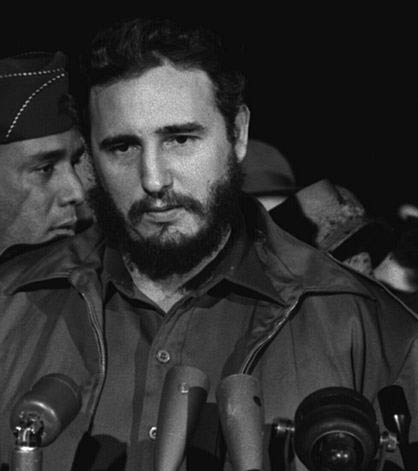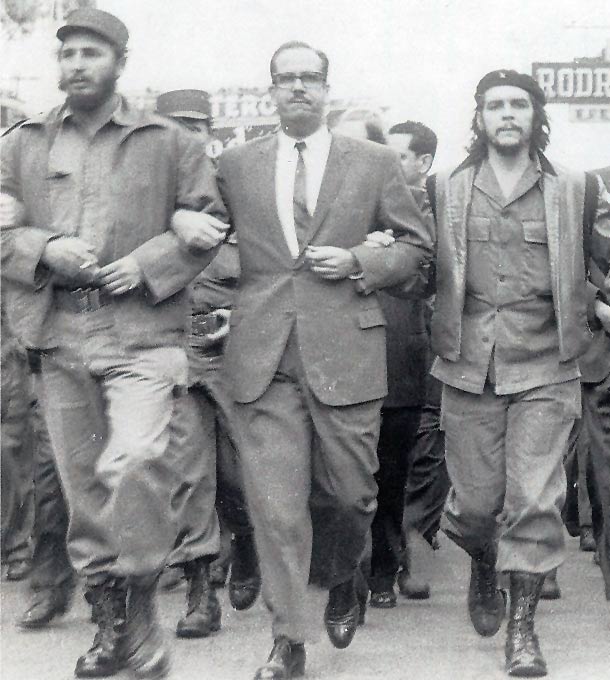Fidel Castro biography

Fidel Castro
Fidel Castro (August 13, 1926 – ) Cuban revolutionary and President of Cuba. Castro led Cuba in a Communist revolution which led to a profound change in the economic and political fortunes of the country. Castro reorganised the economy on Marxist-Lennist principles. He is lauded by many for promoting education, social values, egalitarianism and standing up to ‘US imperialism’. He is also criticised by many for the suppression of dissent, lack of democracy and a worsening economy, which has led many Cubans to flee the country.
Early life Fidel Castro
Fidel Castro was born 13 August, 1925, in Birán, Oriente Province. He was the son of a wealthy farmer and his mistress. After a rebellious, though non-political childhood, in 1945, he went to study law at the University of Havana. He became interested in politics and critical of the current Cuban government. At university he joined the egalitarian, left-leaning – Party of the Cuban People, which opposed the ruling government and was committed to democracy and open government. After university, he travelled throughout Latin-America, participating in rebellions in the Dominican Republic and Colombia. His travels and political experiences pushed him further towards Marxist-Lennist thought and he came to support the idea of a ‘dictatorship of the proletariat’ as envisaged by Marx.
“I am a Marxist-Leninist, and I will be a Marxist-Leninist until the last days of my life.”
– Fidel Castro (2 December, 1961)
Castrol also later adapted Marx’s saying to say
“We have a theoretical concept of the Revolution which is a dictatorship of the exploited against the exploiters.”
As quoted in With Fidel : A Portrait of Castro and Cuba (1976)
Insurrection of 1953
In 1953, he led an attempt to overthrow Fulgencio Batista’s right-wing military junta. But, the attack on Moncada Barracks failed, and Castro was jailed for a year for his participation. His trial proved a semi-propaganda coup for Castro as he gave a four hour speech ‘History will absolve me’ – which spoke against the injustice of Batista’s regime.
“I warn you, I am just beginning! If there is in your hearts a vestige of love for your country, love for humanity, love for justice, listen carefully. I know that I will be silenced for many years; I know that the regime will try to suppress the truth by all possible means; I know that there will be a conspiracy to bury me in oblivion. But my voice will not be stifled – it will rise from my breast even when I feel most alone, and my heart will give it all the fire that callous cowards deny it” (Excerpt from speech 1952)
He also gave five revolutionary principles which were:
- The reinstatement of the 1940 Cuban constitution.
- A reformation of land rights.
- The right of industrial workers to a 30% share of company profits.
- The right of sugar workers to receive 55% of company profits.
- The confiscation of holdings of those found guilty of fraud under previous administrative powers.
Whilst in prison he founded the “26th of July Movement” (MR-26-7) which became a study group for Marxist ideals, with Castro as its leader.
On his release, he travelled to Mexico where he joined with Che Guevara and his brother Raul Castro to form a revolutionary movement, committed to the ideals of Marxism-Lennism. The aim of the group was to overthrow the ‘Capitalist-Imperialist’ regimes and replace them with a Communist government which would promote the welfare of the ordinary workers and peasants.
In Cuba, resentment at Batista’s dictatorship grew, and in 1959, Castro was a leading figure in the Cuban revolution which successfully overthrew Batista and led to Castro emerging as the dominant military and political leader. On 16 February 1959, he was sworn in as Prime Minister of Cuba. On consolidation of power, Castro introduced sweeping economic reforms – a planned Communist state, which would guarantee health care, a sweeping growth of education and social services for all. Foreign investors were prohibited from further foreign land ownership. Land ownership was limited and around 200,000 peasants were given land ownership.

Fidel Castro in Washington, US 1959 – where he met Richard Nixon
In foreign policy, Castro aligned himself with the Soviet Union. Castro received economic help from the Soviet Union; the Soviet Union in return received an ally in a strategically important location, close to the US.

Fidel Castro (left) – Che Guevara (right)
At the height of the cold war, the US were deeply alarmed by having a near neighbour become a Soviet allied Communist state. The US responded by imposing economic sanctions and sponsoring attempts to assassinate Castro and overthrow Castro’s regime. This culminated in the 1961 Bay of Pigs invasion, which was promoted by the CIA and Cuban rebels. The invasion was a military disaster and embarrassment to the US, and only served to strengthen Castro’s position. In the eyes of many Cubans, Castro became a heroic figure for standing up to American aggression.
In 1962, Castro agreed to the Soviet Union placing nuclear war-heads on Cuban soil. This provoked a diplomatic showdown as the US were concerned about having nuclear warheads moved so close to its territory. After tense negotiations involving UN Secretary General U Thant, the crisis was defused and nuclear warheads were not kept in Cuba. But, the experience strengthened the US determination to weaken or overthrow Castro. This political apathy to Castro was heightened by up to a million refugees who fled Cuba and Castro’s regime to live in US. Refugees from Cuba were mainly middle-class professionals, such as doctors and engineers who were most likely to oppose Castro’s regime.
Internal Dissent
In addition to promoting a State controlled economy, Castro also instigated a control of the press and suppressed internal dissent, allowing no political opposition, and imprisonment of ‘counter-revolutionaries’ who wanted to oppose Castro’s rule.
In the late 1960s, Castro became some-what estranged from the Soviet Union and he became the leader of the Non-Aligned Movement. Though dependent on Soviet economic aid, he also remained tied to the Soviet Union through the Warsaw pact.
Castro was a great believer in spreading revolution throughout the world. He sent Cuban troops to African countries, such as Anglo and Libya. He also gained the support of many Arab countries for breaking off relations with Israel, in response to the Israel-Palestine conflict.
During the 1980s, Castro faced increased difficulties. The US president Reagan took a hard-line to Cuba and this led to a heightening of rhetoric between the two countries. In the Soviet Union, the reforming President Gorbachev announced Perestroika and Glasnost – which involved economic liberalisation and political liberalisation. This meant a decline in support for Cuba. But, Castro did not follow Gorbachev’s lead and increasingly clamped down on dissent. The worsening economic situation throughout the 1980s, ebbed away Castro’s populism which he had enjoyed since the revolution.
Fall of Soviet Communism
In 1991, the Soviet Union fell apart and one party Communist rule ended in the Soviet Union. This led to Soviet aid ceasing, leading to a worsening of the economic situation in Cuba as the economy was struggling due to US sanctions and only limited tourism.
By 1992, the Cuban economy had declined by 40% and severe rationing was in place. In response, Castro became more moderate in dealing with ‘Capitalist’ nations and sought to diversify the economy into tourism and biotechnology – trying to reduce the economies reliance on sugar.
Castro sought to gain new alliances with left-leaning Latin American countries, such as Hugo Chavez’s Venezuela and Boliva. The alliance with Venezuala proved of mutual benefit as Cuba gained oil imports in return for medical services. Castro also allowed a softening of attitudes to religion and the catholic church – he arranged a visit by Pope John Paul II which led to improved relationships between the government and the Catholic Church. But, still many thousands of people wished to emigrate to US.
In the 1990s, Castro embraced environmentalism and sought to improve Cuba’s environmental impact – something which was successful. However, despite some attempts at moderation, Castro has continued his criticism of US led hegemony, accusing the US of being the worst polluter and also a strong proponent of the anti-globalisation movement.
In 2008, worsening health problems caused Castro to hand over the Presidency to his brother Raul.
Castro has declared himself and atheist and has criticised the use of the Bible for anti-egalitarian ideas. However, he has said that from Christianity has many egalitarian ideas. “If people call me Christian, not from the standpoint of religion but from the standpoint of social vision, I declare that I am a Christian.
Fidel Castro is a popular political figure in many developing economies – Africa and Latin America for his belief in egalitarianism and anti-imperialism. However, he is severely criticised in many Western countries, especially the US for his rejection of democracy and suppression of internal dissent. Within Cuba, he remains popular with a large section of the population for his nationalism and egalitarianism. However, at the same time, many middle-class Cubans have left in frustration at the economic and political limitations.
Since his retirement and ill-health, Castro is not involved in government, but he is still one of the dominant personalities of Cuba. In 2015, Barack Obama said he would begin normalising relations with Cuba, leading to the possibility that the decades of sanctions could be lifted.
EmoticonEmoticon